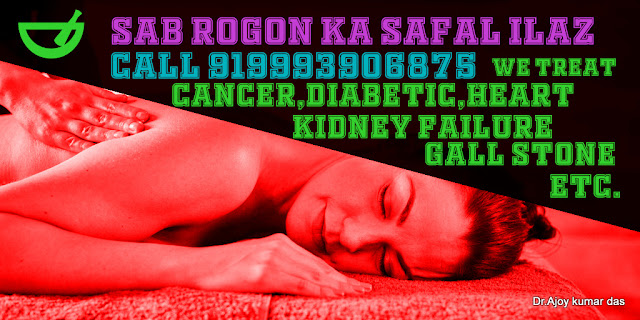CANCER
TREATMENT BY DOCTOR AJOY
FROM DOCTOR
AJOY ON CANCER TREATMENT !
Breast cancer
is cancer that forms in the cells of the breasts.
After skin
cancer, breast cancer is the most common cancer diagnosed in women in the INDIA AND United States. Breast cancer can
occur in both men and women, but it's far more common in women.
Symptoms
Nipple changes
Signs and
symptoms of breast cancer may include:
A breast lump
or thickening that feels different from the surrounding tissue
Change in the
size, shape or appearance of a breast
Changes to the
skin over the breast, such as dimpling
A newly
inverted nipple
Peeling,
scaling, crusting or flaking of the pigmented area of skin surrounding the
nipple (areola) or breast skin
Redness or pitting
of the skin over your breast, like the skin of an orange
A number of
inherited mutated genes that can increase the likelihood of breast cancer have
been identified. The most well-known are breast cancer gene 1 (BRCA1) and
breast cancer gene 2 (BRCA2), both of which significantly increase the risk of
both breast and ovarian cancer.
Causes
Doctors know
that breast cancer occurs when some breast cells begin to grow abnormally.
These cells divide more rapidly than healthy cells do and continue to accumulate,
forming a lump or mass. Cells may spread (metastasize) through your breast to
your lymph nodes or to other parts of your body.
Breast cancer
most often begins with cells in the milk-producing ducts (invasive ductal
carcinoma). Breast cancer may also begin in the glandular tissue called lobules
(invasive lobular carcinoma) or in other cells or tissue within the breast.
Risk factors
A breast cancer
risk factor is anything that makes it more likely you'll get breast cancer. But
having one or even several breast cancer risk factors doesn't necessarily mean
you'll develop breast cancer. Many women who develop breast cancer have no
known risk factors other than simply being women.
Factors that
are associated with an increased risk of breast cancer include:
Being female.
Women are much more likely than men are to develop breast cancer.
Increasing age.
Your risk of breast cancer increases as you age.
A personal
history of breast conditions. If you've had a breast biopsy that found lobular
carcinoma in situ (LCIS) or atypical hyperplasia of the breast, you have an
increased risk of breast cancer.
A personal
history of breast cancer. If you've had breast cancer in one breast, you have
an increased risk of developing cancer in the other breast.
A family history
of breast cancer. If your mother, sister or daughter was diagnosed with breast
cancer, particularly at a young age, your risk of breast cancer is increased.
Still, the majority of people diagnosed with breast cancer have no family
history of the disease.
Inherited genes
that increase cancer risk. Certain gene mutations that increase the risk of
breast cancer can be passed from parents to children. The most well-known gene
mutations are referred to as BRCA1 and BRCA2. These genes can greatly increase
your risk of breast cancer and other cancers, but they don't make cancer
inevitable.
Radiation
exposure. If you received radiation treatments to your chest as a child or
young adult, your risk of breast cancer is increased.
Obesity. Being
obese increases your risk of breast cancer.
Beginning your
period at a younger age. Beginning your period before age 12 increases your
risk of breast cancer.
Beginning
menopause at an older age. If you began menopause at an older age, you're more
likely to develop breast cancer.
Having your
first child at an older age. Women who
give birth to their first child after age 30 may have an increased risk of
breast cancer.
Having never
been pregnant. Women who have never been pregnant have a greater risk of breast
cancer than do women who have had one or more pregnancies.
Postmenopausal
hormone therapy. Women who take hormone therapy medications that combine
estrogen and progesterone to treat the signs and symptoms of menopause have an
increased risk of breast cancer. The risk of breast cancer decreases when women
stop taking these medications.
Drinking
alcohol. Drinking alcohol increases the risk of breast cancer.
IF YOU HAVE
CANCER IN YOUR BODY YOU MUST GO FOR HERBAL OR ANY ALTERNATIVE TREATMENT BECAUSE
CHEMO RADIATION WILL KILL YOU BETTER YOU VISIT MY WEBSITE OR YOU CAN SEARCH
INTERNET ,THERE YOU WILL FIND ABOUT THE DANGER OF CHEMO AND RADIATION .IN
AMERICA FOR CANCER TREATMENT YOU NEED 35 MILLION DOLLAR IN INDIA YOU HAVE TO
SPEND 2/3 MILLION RUPEES INR BUT AFTER THAT CANCER PATIENT WILL DIE 100 % .IN
OUR HERBAL+ALTERNATIVE TREATMENT PATIENT NEED ONLY $ 1000 AND PATIENT WILL LIVE
AND FREE FROM CANCER ,DOCTOR AJOYS PERMANENT TREATMENT !
CALL
DOCTOR AJOY DAS FOR APPOINTMENT
91 62 61 68 04
44 ,91 91 09 71 42 70
E MAIL doctordas 8 @ g mail dot com
website http://www dot doctor ajoy kumar das dot on line
you can see
3000 video on doctor ajoy and can read 3500 blogs on bloger







No comments:
Post a Comment